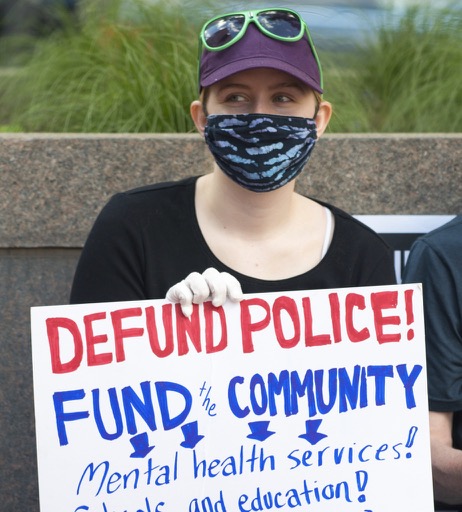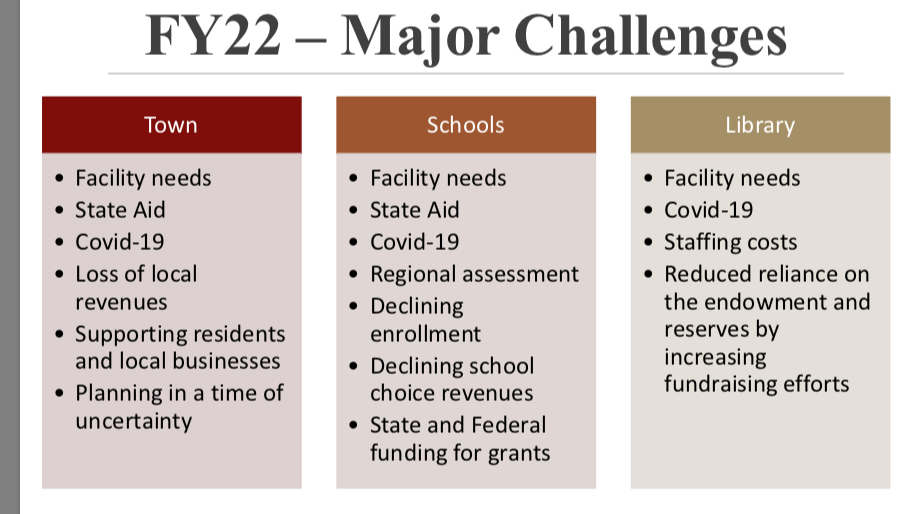Public Testimony Prioritizes Community And Youth Services Over Police Funding

Photo: wikimedia commons
Report on the Town Council/Finance Committee Public Forum On The Town Budget (11/19/20)
The meeting was held as a Zoom Webinar and was simulcast on Amherst Media Channel 17. The recording of that meeting can be viewed here.
Participating
Councilors At-large: Alisa Brewer, Mandi Jo Hanneke, Andy Steinberg
District Councilors: Cathy Schoen and Sarah Swartz (District 1), Pat DeAngelis and President Lynn Griesemer (District 2), Dorothy Pam and George Ryan (District 3), Steve Schreiber and Evan Ross (District 4), Shalini Bahl-Milne and Darcy DuMont (District 5)
Representing the Finance Committee: Council members Steinberg (Chair), Griesemer, Schoen, DeAngelis, Pam, and non-voting member Bob Hegner.
Staff: Town Manager Paul Bockelman, Budget Director Sean Mangano
A public forum about the Budget is required by the Town Charter and must devote at least 50 percent of the forum to public comment. The forum is an opportunity for the public to weigh in before the budget is drafted.
Prior to taking public comment, Town Manager Paul Bockelman and Budget Director Sean Mangano provided a report on the current fiscal status of the town, a preliminary draft of the FY22 budget, and a timetable for completing the budget process. The full presentation can be viewed here.
Their overall assessment is that the Town has, to this point, weathered well the economic challenges of the pandemic and that it is in a good fiscal position going into FY 22. With the pandemic surging, however, the near future remains uncertain and plenty of challenges remain.
The Town faced major challenges in FY 21, largely due to the pandemic. These included:
- Reduced revenues due to economic impacts of COVID-19 on state aid, local receipts, and enterprise funds
- Managing public health and public safety
- Manage the high degree of uncertainty
- Providing necessary support for residents (e.g. housing, food, health, remote services)
- Providing necessary support for businesses (e.g. flexibility on permitting and licenses)
- Dealing with the end of CARES Act funding and the reduction in state aid
- Returning to in-person instruction in schools and university
The report listed the following strengths for town finances going into FY22:
- Strong fiscal management
- A strong AA+ bond rating
- Healthy reserves
- Strong budgetary flexibility supported by maintain reserves at 5 to 15 percent
- Low debt services as a percent of total governmental fund expenditures
- Strong collaboration among elected officials and town staff
- Level-funded operating budgets in FY 21 to meet the challenges of reduced revenues
- Reduced capital spending in FY 21 to meet the challenges of reduced revenues
- In discussing major challenges for the coming fiscal year, Bockelman and Mangano recognized the continued challenges of the ongoing pandemic. In addition they noted the following major challenges for FY22.

More information on the budget can be found at www.amherstma.gov/budget. Residents can submit feedback by using the feedback button at that site.
Public Hearing
Eight Amherst residents spoke during the public hearing section of the meeting. All expressed concern about the disproportionate funding of the police compared to funding of necessary human services. All spoke of the historic neglect of the needs of BIPOC people in Amherst and the need to allocate more funds to support diverse populations in town, to address racism and discrimination, and to meet the needs of the town’s most needy residents, All expressed desire for a just and equitable community for all of Amherst’s residents and for those priorities to be reflected in town budgeting and spending.
Lydia Irons asked the Council to prioritize the needs of the BIPOC residents of Amherst. She pointed out that she works in a COVID ward and is intimately familiar with the impacts of the pandemic in general and on the Amherst community. She pointed out that the town spends far more on the police ($136/year/resident) than it does on public health (only $3.77). She argued that the town should prioritize the needs of its residents and divert funds from “a bloated police budget” to meet those needs.
Zoe Crabtree highlighted the need for reducing systemic racism in town and for this priority to be reflected in the town budget. She said that if we want to be an equitable and just community, we should approve the Amherst Racial Equity Task Force’s requests for funds for a citizens’ public safety commission, which she said would have a different, more inclusive mission than the Town’s Public Safety Working Group. She asked the Councilors, “What are you going to do to make the town safer for its BIPOC community members?” She also shared anonymous testimony from a District 4 resident who said that police disproportionately target Black, Brown, and disabled people, and as a result many residents do not feel safe in town. She asked that the police budget be reallocated “to meet the needs of residents” and said that policing further compounds racism.
Allegra Clark spoke as an Amherst Regional High School graduate recently returned to Amherst. She said that for Amherst to be an equitable and just community it must prioritize the needs of BIPOC residents and reallocate funds from the police to community needs and addressing systemic racism. She said that need is apparent throughout town and has been exacerbated by the pandemic. For example, she said, the Amherst Survival Center is serving 50 percent more meals than they did pre-pandemic. She asked that the Councilors pay attention to where the needs of the community are and to address them, especially during the pandemic She asked that Councilors consider proposals from the Racial Equity Task Force of Amherst to fund a cultural center, a Town diversity officer, and a youth counselor.
Isolda Ortega Bustamante spoke in support of the work of Defund 413 and of the Town’s need for a dedicated bilingual social worker, noting that much-needed work for families on the edge is currently being provided by volunteers.
Maida Ives affirmed the requests of those who spoke before her, highlighting the need for Town diversity and equity officers, a cultural center, and youth programming.
Demetria Shabazz argued that the Town ought to prioritize in its budget the things that it values and that taking care of residents ought to be at the top of the list. She said that the town needs to do better at taking care of people in need in a way that is non-threatening.
Jose Lugo, the final speaker, also spoke in favor of cutting the police budget. He has observed that residents do not find it easy to work with the Council to meet the needs of underrepresented folks in town. Systemic obstacles are in place, he said, and it would be useful to shift resources from the police to organizations within underrepresented communities that could undertake the work of taking care of themselves.
Following the public testimony the hearing adjourned without further comment from Town officials.

1 thought on “Public Testimony Prioritizes Community And Youth Services Over Police Funding”